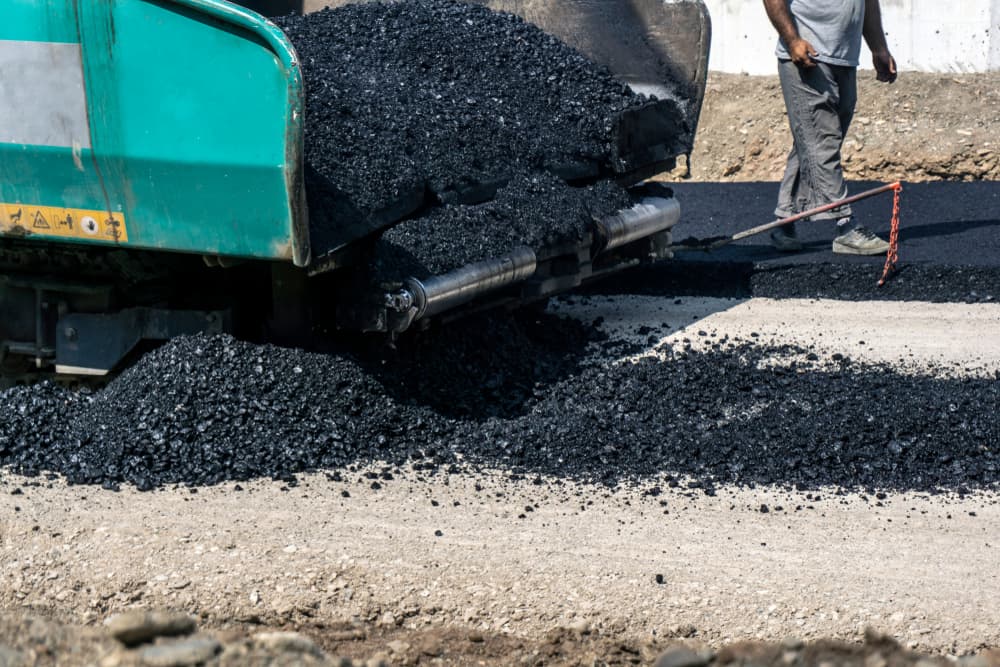Checking Out the Numerous Sorts Of Asphalt Paving and Their Advantages
From the durable features of Hot Mix Asphalt to the environment-friendly features of Recycled Asphalt Sidewalk, understanding these choices can substantially influence job end results. Technologies such as Cozy Mix Asphalt and Porous Asphalt introduce additional layers of efficiency and sustainability.
Hot Mix Asphalt
When thinking about one of the most efficient leading options, warm mix asphalt (HMA) attracts attention as a top choice for many applications (paving). HMA is a versatile paving material known for its resilience, versatility, and general performance. It is produced by heating asphalt binder and combining it with accumulations at heats, guaranteeing a consistent mix that can stand up to different environmental conditions
Among the main advantages of HMA is its ability to offer a smooth, skid-resistant surface area, enhancing security for lorries and pedestrians alike. Additionally, HMA exhibits excellent resistance to contortion, making it optimal for high-traffic areas such as freeways and car parking great deals. Its flexibility to different climates further adds to its extensive use.
The installation procedure of HMA is fairly quick, enabling effective project conclusion with very little disruption to website traffic. It can be recycled, decreasing waste and promoting sustainability within the building and construction market. paving service. Generally, hot mix asphalt continues to be a top selection for paving specialists because of its robust performance characteristics and lasting cost-effectiveness, making it a trusted service for various facilities needs
Warm Mix Asphalt
Cozy mix asphalt (WMA) provides a cutting-edge option to warm mix asphalt, offering comparable benefits while requiring lower manufacturing temperatures. Commonly produced at temperature levels between 190 ° F and 250 ° F, WMA innovation lowers energy usage and greenhouse gas exhausts during manufacturing, making it an extra eco friendly alternative.
Among the essential benefits of WMA is its extensive workability period. The lower temperature levels permit for much more effective transport and positioning, especially in cooler climate condition. This versatility can cause boosted compaction and overall sturdiness of the asphalt surface area. In addition, WMA can be used in various applications, ranging from highways to property driveways, without endangering efficiency.

The consolidation of additives or customized binders in WMA adds to its enhanced properties, making sure that it satisfies or surpasses performance standards. WMA's decreased thermal impact throughout manufacturing can reduce the likelihood of damages to the surrounding atmosphere, making it an attractive option for sustainable paving practices.
Cold Mix Asphalt
Cold mix asphalt is a functional paving remedy typically made use of for short-term fixings and low-traffic areas. This kind of asphalt is produced at ambient temperature levels, making it a convenient choice for quick solutions and projects where standard warm mix asphalt may not be practical. The mixture usually is composed of asphalt binder, aggregate, and additives, enabling it to continue to be workable for a prolonged duration.
One of the main advantages of cold mix asphalt is its simplicity of application. It can be mounted without specialized equipment, making it easily accessible for smaller sized professionals and DIY fanatics. In addition, cold mix can be applied in different climate condition, which is particularly advantageous for immediate repair requirements.

Cold mix asphalt is also cost-effective, as it enables budget-friendly repairs without sacrificing quality. Its versatility makes it ideal for patching holes, filling fractures, and resurfacing driveways. Although it may not offer the exact same long-lasting longevity as warm mix asphalt, its fast application and flexibility make it a superb selection for short-lived remedies and low-traffic applications. On the whole, chilly mix asphalt stays a useful option in the asphalt paving landscape.
(full details)
Permeable Asphalt
Permeable asphalt is an ingenious paving service designed to boost stormwater administration and decrease surface drainage. This kind of asphalt features an one-of-a-kind framework that incorporates interconnected gaps, permitting water to permeate through the surface area and into the underlying layers. By facilitating all-natural drainage, permeable asphalt assists mitigate the threat of flooding and decreases the worry on local stormwater systems.
One of the key benefits of permeable asphalt is its ability to boost water quality. As stormwater infiltrate the pavement, toxins and sediments are entraped, minimizing the variety of pollutants that get in regional rivers. This contributes to much healthier communities and sustains compliance with ecological regulations.
Furthermore, permeable asphalt can improve the long life of the pavement itself. By lowering water accumulation on the surface area, it minimizes the capacity for freeze-thaw cycles that can bring about cracking and degeneration. Furthermore, the minimized demand for traditional stormwater administration framework can result in expense financial savings for municipalities and developers.
Recycled Asphalt Pavement
(click here)Recycled asphalt sidewalk (RAP) stands for read this article a sustainable technique to highway construction and maintenance that profits both the setting and the economy. By reusing existing asphalt products, RAP reduces the demand for new basic materials, which subsequently conserves natural deposits and lessens ecological influence. This technique lowers energy usage and greenhouse gas discharges linked with the manufacturing of brand-new asphalt.
The incorporation of RAP into new pavement mixes can likewise cause substantial price financial savings. Contractors can leverage recycled materials to reduce overall project expenses, making it an economically practical option for towns and personal designers alike. Furthermore, RAP uses comparable performance characteristics to virgin asphalt, ensuring resilience and longevity in road surface areas.
RAP's convenience permits it to be made use of in different applications, including highways, parking area, and residential driveways. By boosting the architectural stability of existing pavements, RAP adds to boosted safety and security and level of smoothness of roads.
Conclusion
Finally, the varied kinds of asphalt paving each offer distinct benefits tailored to specific needs. Warm Mix Asphalt masters durability and quick setup for high-traffic areas, while Cozy Mix Asphalt improves sustainability through lowered energy consumption. Cold Mix Asphalt offers as an economical option for immediate repair work, Porous Asphalt successfully manages stormwater, and Recycled Asphalt Pavement advertises environmental duty. Collectively, these leading options add to reliable, environmentally friendly practices in the building industry.